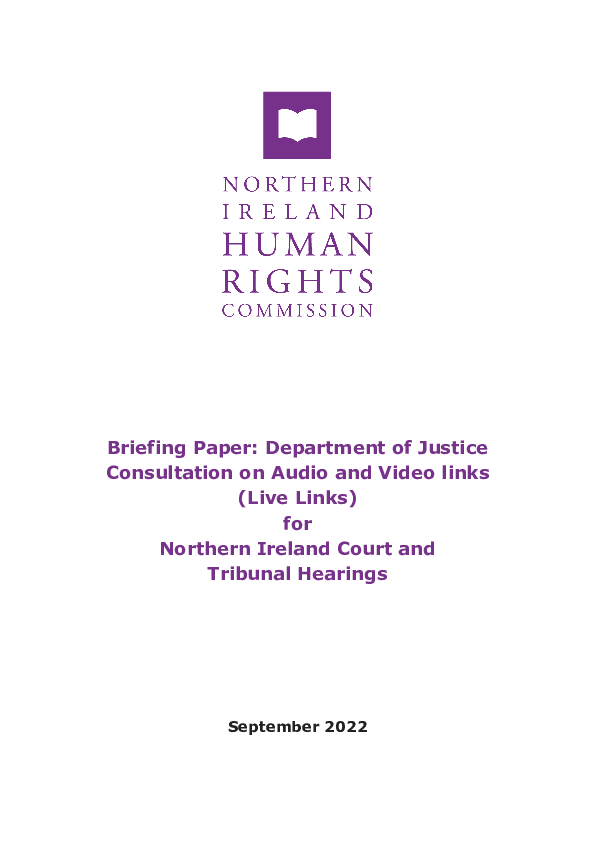Response to the Department of Justice's Consultation on audio and video links for NI Court and Tribunal Hearings
Date produced September 2022
Below is a summary of the key issues.
You can also download the full document through the links provided.
1.Use of Live Links
The European Court of Human Rights (ECtHR) has developed jurisprudence regarding the defendant’s participation in the proceedings by videoconference and their ability to engage in confidential communications with their legal representative. The ECtHR has emphasised that, when assessing the suitability of a live link, there is a need for an appropriate balance to be struck which takes account of the variety of values protected by the ECHR.
The NIHRC recommends that any future legislative provision for the use of live links should provide for live links to be utilised only when a court or Tribunal consider the use of a live link to be ‘in the interests of justice’. In determining if the use of a live link is in the interests of justice a court or tribunal should pay due regard to ECHR Article 6 and to relevant jurisprudence of the ECtHR.
2. Vulnerable Court Users
The NIHRC highlights that the use of live links can have specific implications for certain groups of court users, in particular court users with disabilities. Whilst the Department states that there is a general acceptance that live links are suitable for use in criminal and civil cases it acknowledges that during engagement events concerns were raised regarding the suitability of live links for young people and those identified as “vulnerable”.
The NIHRC recommends that the Department consider conducting or commissioning research to determine if the use of live links has had adverse consequences on the ability of disabled court users to participate in and understand the proceedings. This research should specifically examine whether there has been any hindrance to disabled court users consulting with their legal representatives.
The EU Victims’ Directive reinforces existing national laws and establishes minimum standards on victims’ rights and its purpose is to ensure victims of crime receive appropriate information, support and protection and are able to participate in criminal proceedings.
The NIHRC advises that, in the development of live links legislation and policy, the Department of Justice carefully consider the provisions of the EU Victims’ Directive relating to victims who are disabled, to ensure they able to actively participate in court hearings on an equal basis with others.
The EU Victims’ Directive provides for the right to interpretation and translation for victims “who do not understand or speak the language of the criminal proceedings concerned”. Further, the EU Directive on Interpretation and Translation in Criminal Proceedings makes specific provision for the right to interpretation and contains a number of safeguards to ensure that people for whom English is not a first language can effectively engage with proceedings.
The NIHRC advises the Department of Justice to carefully consider the provisions of the EU Victims’ Directive and the EU Directive on Interpretation and Translation in Criminal Proceedings in relation to vulnerable court users, particularly those for whom English is not a first language, in the development of live links legislation and policy.

Download Documents
Your browser is out-of-date!
Update your browser to view this website correctly. Update my browser now